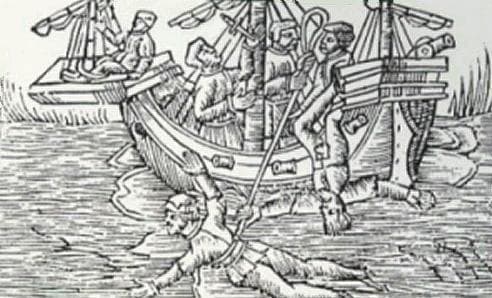-
canguro= kangaroo: from English kanguru, kangaroo, first recorded by Captain James Cook in 1770, from the Guugu Yimidhirr word gangurru. (Australian Aboriginal languages)
-
polo= polo: from English polo (1872), from Balti polo, "ball," from the same family as Tibetan bo-lo "ball." (Balti)
-
merino= type of sheep of North African origin bred in Spain: from Berber Merīn (Modern Spanish Benimerines) the people of North Africa who originallt bred this type of sheep. (Berber)
-
moreno = brown, brunette, dark-skinned person: from moro, "a Moor," from Latin Maurus, from Ancient Greek Maúros, probably of Berber origin, but possibly related to the Arabic maghrib "west," which is possibly from the Semitic root '*gh-r-b' (Berber)
-
moro = a Moor: see moreno above (Berber)
-
calé= a gypsy: from Caló "Gypsy, speaker of Romany," see caló below (Caló)
-
caló = Caló, also black, dark-colored: the word is possibly related to Sanskrit kanlanka "blemish, macula" and/or Ancient Greek kelainós "black." (Caló)
-
cañi= Caló, gypsy: possibly from cali, feminine of calé and/or caló, see calé and caló above (Caló)
-
abalorio = glass bead: from Arabic al-ballūri (البلوري) "of the crystal," from al "the," + ballūr "crystal, beryllium," from Ancient Greek beryllos (βήρυλλος) (l and r switched places through metathesis: ballūr from beryllos), from brullion, from Prakrit veruliya (भेरुलिय), from Pāli veuriya (भेउरिय); possibly from or simply akin to a Dravidian source represented by Tamil veiruor, viar (வெஇருஒர்; விஅர்), "to whiten, become pale."[1] (Dravidian languages)
-
brillante = brilliant, diamond: from brillar "to shine," see brillar below (Dravidian languages)
-
brillar = to shine: possibly from Latin beryllus, "beryllium," from Ancient Greek beryllos (βήρυλλος), see abalorio above (Dravidian languages)
-
mango= mango: from English mango, from Portuguese manga, from Tamil mānkāy (மன்கய்) "mango fruit," from mān "mango tree" + kāy "fruit." (Dravidian languages)
-
mangosta = mongoose: from French mangouste, from Portuguese mangús, from Marathi mangūs (मंगूस) "mongoose," of Dravidian origin. (Dravidian languages)
-
paliacate= handkerchief: shortened from pañuelo de Paliacate, "handkerchief from Paliacte," from Spanish name for Pulicat, a town in the Tiruvallur District, in the state of Tamil Nadu, India. The Spanish pañuelo de Paliacate is a partial calque of French mouchoirs de Paliacate (1788). (Dravidian languages)
-
paria= pariah, outcast: from Tamil paraiyan "pariah," literally "one who plays the drum," (the pariahs of south India were originally a caste of Untouchables that played drums [2]), from parai drum, possibly from parāi to speak. (Dravidian languages)
-
aciago = unhappy, sad: probably from Latin aegyptius dies, "Egyptian day," from Ancient Greek Aigyptiakos (Αιγυπτιακός) "Egyptian" (adjective), from Aigyptos, see egipcio below. (Egyptian)
-
barca = boat, launch, barge: from Late Latin barca, from Ancient Greek báris "flat-bottomed boat, launch" of Egyptian origin. (Egyptian)
-
barco= boat, ship: from barca, see barca above (Egyptian)
-
copto= a Copt, the Coptic language: from Arabic qubt, qibt, "Copts," from Coptic gyptios, "an Egyptian," from Ancient Greek Aigýptios "Egyptian" (adjective), see egipcio below (Egyptian)
-
egipcio = an Egyptian, of Egypt: from Latin Aegyptius, from Aígyptus "Egypt," from Ancient Greek Aigyptos, from regional Egyptian Hikuptah, variant of Egyptian Hat-kaptah, one of the ancient names of Memphis, Egypt. (Egyptian)
-
embarcar = to embark, to board a ship: from Late Latin imbarcare, from in- + barca, see barca above (Egyptian)
-
gitano= a Gitano, a Gypsy: from Medieval Latin '*Aegyptanus', from Latin Aegyptus, see egipcio above. (Egyptian)
-
papel = paper: from Catalán paper, from Latin papyrus, "paper, papyrus," see papiro below (Egyptian)
-
papiro= papyrus: from Latin papyrus, from Ancient Greek pápyros, "papyrus," possibly of Egyptian origin. (Egyptian)
-
coche = car: originally, a carriage pulled by two horses, ultimately from Hungarian kocsi "carriage, cart," short for kocsi szekér "carriage of Kócs," Hungarian city where carriages with suspension were first made. (Hungarian)
-
sable = a sabre/saber (see spelling differences): from Old High German sabel, probably derived from Hungarian szablya (1393), literally "tool to cut with," from szabni "to cut." (Hungarian)
-
caqui = Diospyros plant, and its fruit, the persimmon: from Japanese kaki. (Japanese)
-
quimono = kimono: from Japanese kimono literally "thing to be put on," from ki "to put on, wear," + mono "thing, person." (Japanese)
-
hoz = sickle: from Latin falx "sickle, scythe," possibly from Ligurian. For the change from f in falx to h in hoz see here. (Ligurian)
-
mongol = a Mongol: from Mongolian Mongol "a Mongol," documented first in Chinese měng-kǔ, from uncertain source. (Mongolian)
-
vampire = vampire and vamp = a dangerously attractive woman: from Austrian German Vampyre "vampire," which in turn was borrowed from Serbian вампир (vampir), "vampire", "undead".
(Serbian) (Slavic languages) -
pistola = a pistol: from German Pistole "pistol," from Czech pištal, "pistol, tube."
(Czech) (Slavic languages) -
calesa = kalesa, a carriage with low wheels and a folding cover: from French calèche, from German Kalesche, from Czech kolesa, "calesa, carriage," from kolesa "wheels," plural of koleso "wheel," from Proto-Slavic *kolo "wheel", IE root '*kwel-'[3]
(Czech) (Slavic languages) -
polaco = a Polack: from Polish pol- "field, wide and flat territory."
(Polish) (Slavic languages) -
polka
(Polish) (Slavic languages) -
babushka
(Russian) (Slavic languages) -
rutenio = ruthenium: from Medieval Latin Ruthenia "Russia" (the element was discovered in the Urals), from Rutheni, Ruteni "Russians," from Old Russian Rus' "Russia"
(Russian) (Slavic languages) -
sputnik = satellite: from Russian s = with/from + put = road + -nik = derivative for objects of people carrying out an action (masc.)
(Russian) (Slavic languages) -
vodka
(Russian) (Slavic languages) -
corbata = necktie, cravat: from Italian carvatta "wool scarf used by Croatian soldiers in the 17th century" with implicit sense "Croatian scarf," from Croatian hrvat "Croat, dof Croatia," of uncertain origin, but from the same root as Old Slavic Chǔrvatinǔ "Croat."
(Croatian) (Slavic languages)
New Random Display Display All Items(40)









